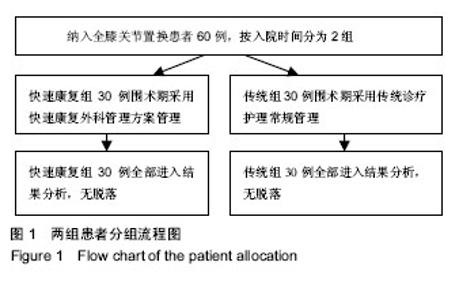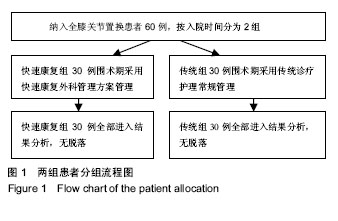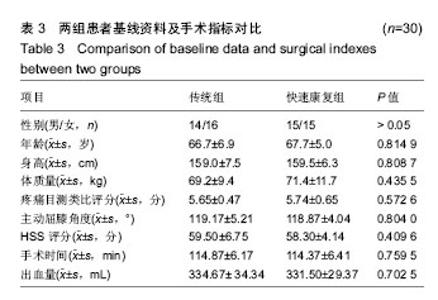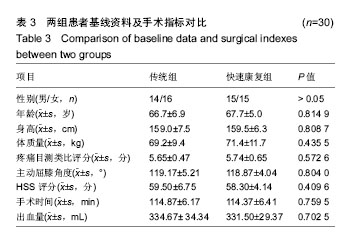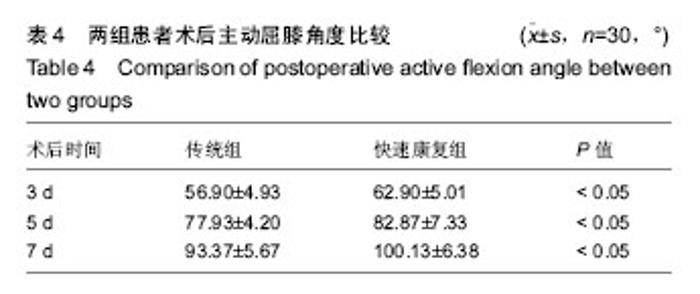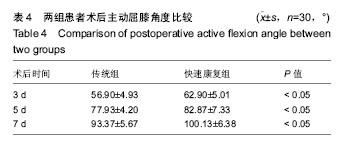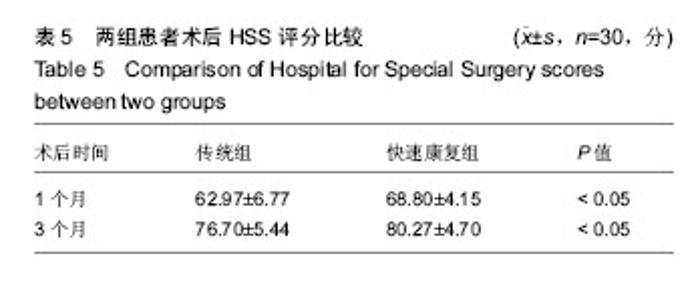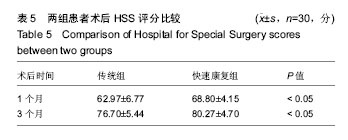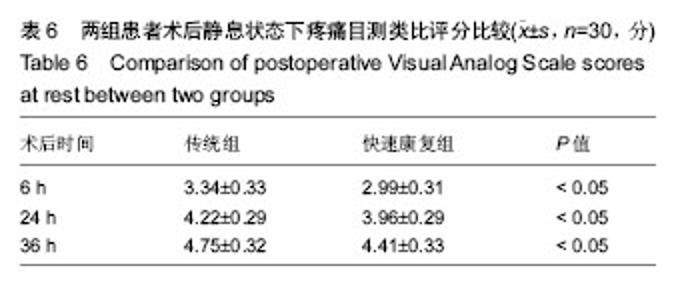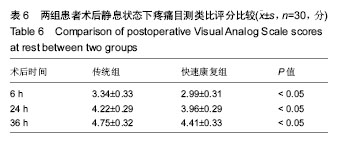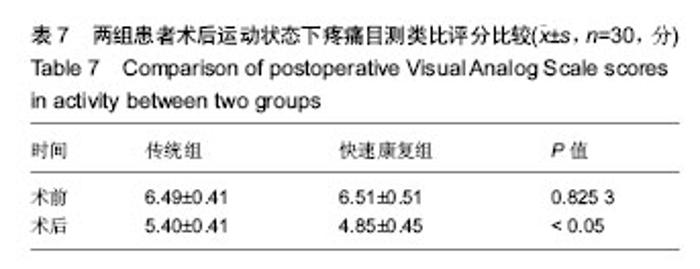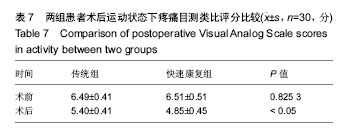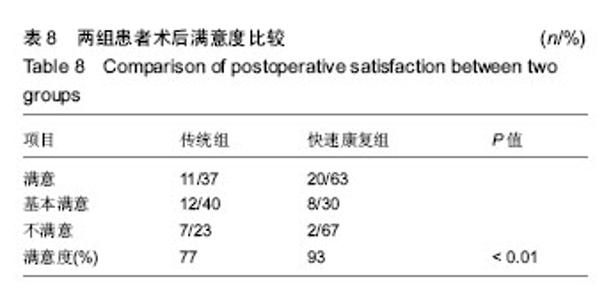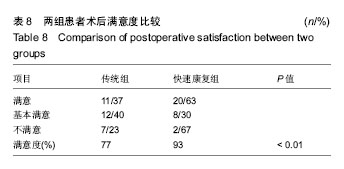Chinese Journal of Tissue Engineering Research ›› 2019, Vol. 23 ›› Issue (16): 2467-2472.doi: 10.3969/j.issn.2095-4344.1201
Previous Articles Next Articles
Implementation of enhanced recovery after surgery in perioperative management of total knee arthroplasty
Jin Jia1, Xu Wei1, Ai Hongzhen2
- 1Department of Orthopedics, 2Department of Nursing, the Second Affiliated Hospital of Soochow University, Suzhou 215000, Jiangsu Province, China
-
Online:2019-06-08Published:2019-06-08 -
Contact:Ai Hongzhen, Master, Associate chief physician, Department of Nursing, the Second Affiliated Hospital of Soochow University, Suzhou 215000, Jiangsu Province, China -
About author:Jin Jia, Nurse-in-charge, Department of Orthopedics, the Second Affiliated Hospital of Soochow University, Suzhou 215000, Jiangsu Province, China -
Supported by:the National Natural Science Foundation of China (General Program), No. 81472105 (to XW)| Suzhou Minsheng Science and Technology-Basic Applied Research on Medical and Health, No. SYSD2016097 (to JJ)
CLC Number:
Cite this article
Jin Jia, Xu Wei, Ai Hongzhen. Implementation of enhanced recovery after surgery in perioperative management of total knee arthroplasty[J]. Chinese Journal of Tissue Engineering Research, 2019, 23(16): 2467-2472.
share this article
| [1] 于芝,丁宁,叶青山. 不同镇痛方式对全膝关节置换术后疼痛应激反应的影响[J]. 养生保健指南, 2017,16(26): 21-23.[2] Lavernia C, Cardona D, Rossi MD, et al. Multi-population and diffusion UMDA for dynamic multimodal problems. J Syst Eng Electr. 2010;23(5): 777-783.[3] 曲音音.快速康复外科理念下全膝关节置换术围术期镇痛进展[J].中国微创外科杂志,2016,16(2):172-176.[4] Rasanen P. Effectiveness of hip or knee replacement surgery in terms of quality-adjusted life years and costs. Acta Orthop. 2007; 78(1):108-115. [5] 沈彬,翁习生,廖刃,等.中国髋、膝关节置换术加速康复--围术期疼痛与睡眠管理专家共识[J].中华骨与关节外科杂志, 2016,9(2): 91-97.[6] Parvizi J, Miller AG, Gandhi K. Multimodal pain management after total joint arthroplasty. J Bone Joint Surg Am. 2011;93 (11): 1075-1084.[7] Straube S,Derry S,McQuay HJ,et al.Effect of preoperative cox-ter total joint arthroplasty. J Bone Joint Surg Am, 20a systematic revies of randomized studies. Acta Anaesthesiol Scand. 2005;49(5):601-615.[8] 田梅梅,杨柳柳,龚美芳,等.加速康复外科理念在人工全膝关节置换患者术后护理中的应用[J].中华现代护理杂志, 2016,22(29): 4233-4237. [9] 冯金华,许瑞华,李卡,等. 加速康复外科围术期管理模式对肝内外胆管结石患者术后康复效果的影响[J].重庆医学, 2018,47(21): 2777-2785. [10] 刘四清,赵汉平.全膝关节置换后康复效果及患者满意度的比较研究[J].实用医药杂志,2016,33(3):241-243.[11] 郑炜宏,高大伟,唐剑邦,等. 膝关节置换术后康复治疗小组模式的建立及应用[J].中华关节外科杂志:电子版, 2017,11(2):80-83.[12] 张哲,马辉,康一凡.本体感觉训练在全膝关节置换后康复中的应用价值[J].中华关节外科杂志(电子版),2016,10(4):376-379.[13] 朱诗白,翟洁,蒋超,等.膝关节置换围手术期的快速康复措施[J].中国组织工程研究,2017,21(3):456-463.[14] 谢峰.人工全膝关节置换术58例临床治疗效果研究[J].中外医疗, 2015,34(19):87-88.[15] 王东伟.关节置换治疗老年膝关节退行性骨关节炎的效果分析[J].中国保健营养,2016,26(26):135-136.[16] 刘志宏,张炅,何川,等.活动平台全膝关节假体和单髁膝关节假体置换术后的步态对比分析[J].中华关节外科杂志(电子版), 2017, 11(1):17-23.[17] 郭永亮.三维步态分析重复性经颅磁治疗帕金森的临床疗效[J].医学理论与实践,2017,30(2):298-299.[18] 时会娟,黄红拾,于媛媛.单纯前交叉韧带断裂与合并半月板损伤患者的步态分析[J].中国运动医学杂志,2017,36(10):858-864.[19] 杜玲玲,夏清.脑卒中偏瘫患者膝过伸步态运动学特点分析[J].中国康复,2018,33(1):7-10.[20] 李勇,方旭昊,毛仁玲, 等.老年正常压力脑积水患者与脑卒中患者三维步态参数的差异性研究[J].老年医学与保健, 2017,23(4): 324-327. [21] Auyong DB, Allen CJ, Pahang JA, et al. Reduced Length of Hospitalization in Primary Total Knee Arthroplasty Patients Using an Upda,ted Enhanced Recovery After Orthopedic Surgery (ERAS) Pathway. J Arthroplasty. 2015;30(10): 1705-1709.[22] Kehlet H. Fast-track hip and knee arthroplasty. Lancet. 2013,381: 1600-1602.[23] Khan SK, Malviya A, Muller SD, et al. Reduced short-term complications and mortality following Enhanced Recovery primary hip and knee arthroplasty: results from 6,000 consecutive procedures. Acta Orthop. 2014; 85(1): 26-31.[24] den Hartog YM, Mathijssen NM, Vehmeijer SB. Reduced length of hospital stay after the introduction of a rapid recovery protocol for primary THA procedures. Acta Orthop. 2013;84(5): 444-447.[25] Stowers MD, Manuopangai L, Hill AG, et al. Enhanced RecoveryAfter Surgery in elective hip and knee arthroplasty reduces length of hospital stay. ANZ J Surg. 2016;86(6): 475-479.[26] Khan SK, Malviya A, Muller SD, et al. Reduced short-term complications and mortality following Enhanced Recovery primary hip and knee arthroplasty: results from 6,000 consecutive procedures. Acta Orthopaedica. 2014;85(1):26-31.[27] Wiesmann T, Piechowiak K, Duderstadt S, et al. Continuous adductor canal block versus continuous femoral nerve block after total knee arthroplasty for mobilisation capability and pain treatment:a randomised and blinded clinical trial. Arch Orthop Trauma Surg.2016;136(3):397-406.[28] Abdallah FW, Whelan DB, Chan VW, et al. Adductor canal block provides noninferior analgesia and superior quadriceps strength compared with femoral nerve block in anterior cruciate ligament reconstruction. Anesthesiology.2016;124(5):1053-1064.[29] 窦哲,杨云,黄健.全膝关节置换围手术期的镇痛:措施与对策[J].中国组织工程研究,2018,22(23):3716-3722. [30] 肖军,严格,罗裕强,等. 疼痛对人工膝关节表面置换术后功能康复的影响[J]. 中华关节外科杂志(电子版),2014,8(2):160-165.[31] Kehlet H, Dahl JB. The value of “multimodal” or “banlanced analgesia” in postoperative pain treatment. Anesth Analg. 1993;77(5):1048-1056.[32] Penprase B, Brunetto E, Dahmani E, et al. The efficacy ofpreemptive analgesia for postoperative pain control:a systematic review of the literature. AORN J. 2015;101(1): 94-105.[33] 刘雁,陈亚军,于泳浩.酮咯酸氨丁三醇用于妇科手术后患者自控镇痛[J].临床麻醉,2009,47(7):100-101.[34] 裴东颜.膝关节置换术后30例康复护理体会[J].中国社区医师, 2017,33(5):134-135. |
| [1] | Wang Jinjun, Deng Zengfa, Liu Kang, He Zhiyong, Yu Xinping, Liang Jianji, Li Chen, Guo Zhouyang. Hemostatic effect and safety of intravenous drip of tranexamic acid combined with topical application of cocktail containing tranexamic acid in total knee arthroplasty [J]. Chinese Journal of Tissue Engineering Research, 2021, 25(9): 1356-1361. |
| [2] | Zhao Zhongyi, Li Yongzhen, Chen Feng, Ji Aiyu. Comparison of total knee arthroplasty and unicompartmental knee arthroplasty in treatment of traumatic osteoarthritis [J]. Chinese Journal of Tissue Engineering Research, 2021, 25(6): 854-859. |
| [3] | Yuan Jun, Yang Jiafu. Hemostatic effect of topical tranexamic acid infiltration in cementless total knee arthroplasty [J]. Chinese Journal of Tissue Engineering Research, 2021, 25(6): 873-877. |
| [4] | Deng Zhibo, Li Zhi, Wu Yahong, Mu Yuan, Mu Yuexi, Yin Liangjun. Local infiltration anesthesia versus femoral nerve block for pain control and safety after total knee arthroplasty: a meta-analysis [J]. Chinese Journal of Tissue Engineering Research, 2021, 25(21): 3401-3408. |
| [5] | Mieralimu•Muertizha, Ainiwaerjiang•Damaola, Lin Haishan, Wang Li . Relationship between tibio-femoral mechanical axis deviation on coronal plane and early joint function recovery after total knee arthroplasty [J]. Chinese Journal of Tissue Engineering Research, 2021, 25(21): 3300-3304. |
| [6] | Huang Chenyu, Tang Cheng, Wei Bo, Li Jiayi, Li Xuxiang, Zhang Huikang, Xu Yan, Yao Qingqiang, Wang Liming. Application of three-dimensional printing guide plate in total knee arthroplasty for patients with varus and valgus deformity [J]. Chinese Journal of Tissue Engineering Research, 2021, 25(18): 2789-2793. |
| [7] | Li Shangzhi, Zheng Dezhi, Liu Jun. Early analgesia of cocktail therapy after total knee arthroplasty with enhanced recovery after surgery program [J]. Chinese Journal of Tissue Engineering Research, 2021, 25(18): 2794-2798. |
| [8] | Liu Jinlei, Yin Li, Zhang Yi, Wang Haitao, Li Zhuangyan, Xia Peige, Qiao Renqiu. Effects of intravenous tranexamic acid combined with periarticular multipoint injection of tranexamic acid cocktail on blood loss and pain after total knee arthroplasty [J]. Chinese Journal of Tissue Engineering Research, 2021, 25(18): 2833-2839. |
| [9] | Xu Hui, Kang Bingxin, Gao Chenxin, Zhao Chi, Xu Xirui, Sun Songtao, Xie Jun, Xiao Lianbo, Shi Qi. Effectiveness of Tuina in the treatment of pain after total knee arthroplasty in patients with knee osteoarthritis [J]. Chinese Journal of Tissue Engineering Research, 2021, 25(18): 2840-2845. |
| [10] | Deng Bo, Hong Hainan, Fan Yongyong, Cai Guoping, Feng Xingbing, Hong Zhenghua. Efficacy and safety of tourniquet application in total knee arthroplasty and only at the time of cementing: a meta-analysis [J]. Chinese Journal of Tissue Engineering Research, 2021, 25(18): 2908-2914. |
| [11] | Liu Kun, Xu Hao, Wang Yingzhen, Zhang Haining, Fang Yuan, Xiang Shuai, Lü Chengyu. Direct repair of medial collateral ligament injury combined with brace in total knee arthroplasty [J]. Chinese Journal of Tissue Engineering Research, 2021, 25(15): 2352-2357. |
| [12] | Lin Yi, Feng Jierong, Luo Xingwen. Mobilization with movement facilitates early functional recovery after fixed-bearing posterior stabilized total knee arthroplasty [J]. Chinese Journal of Tissue Engineering Research, 2021, 25(12): 1842-1846. |
| [13] | Pei Tianlong, Wang Yongkang, Wu Wenjie, Zhao Hong, Wang Longsheng . Anatomical and morphological characteristics of knee joint in hemophilic arthritis patients with three-dimensional CT and X-ray films [J]. Chinese Journal of Tissue Engineering Research, 2021, 25(12): 1886-1890. |
| [14] | Wang Feng, Ju Xiaocong, Wang Bing, Sun Haining. Lateral unicompartmental knee arthroplasty and total knee arthroplasty for treating lateral single compartment knee osteoarthritis [J]. Chinese Journal of Tissue Engineering Research, 2021, 25(12): 1836-1841. |
| [15] | Sun Kai, Chen Lei, Mai Yao, Hu Hua, Chen Liang, Zhong Jun, Hu Yong, Qiu Bo. Clinical application of enhanced recovery after surgery in the perioperative period of anterior cruciate ligament reconstruction [J]. Chinese Journal of Tissue Engineering Research, 2021, 25(11): 1647-1651. |
| Viewed | ||||||
|
Full text |
|
|||||
|
Abstract |
|
|||||
